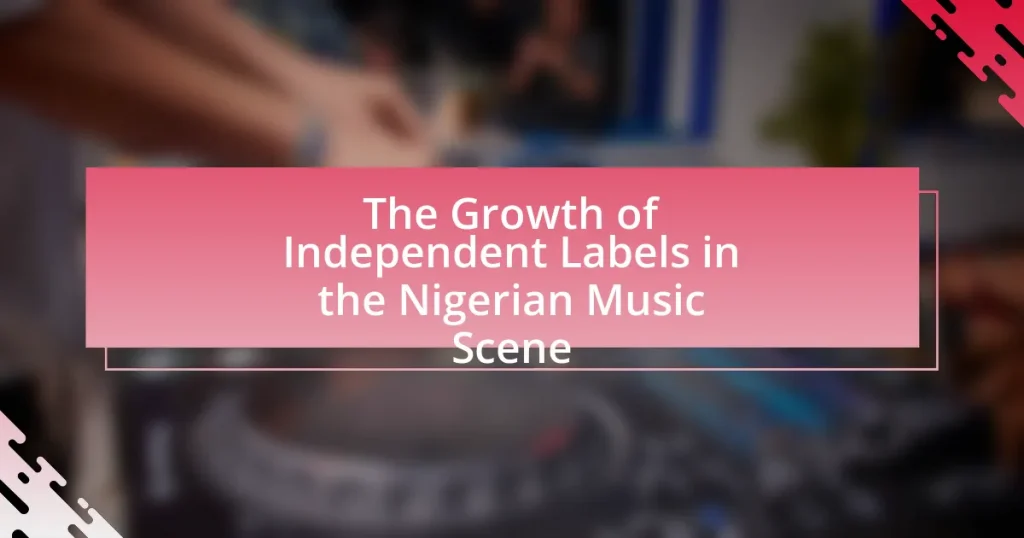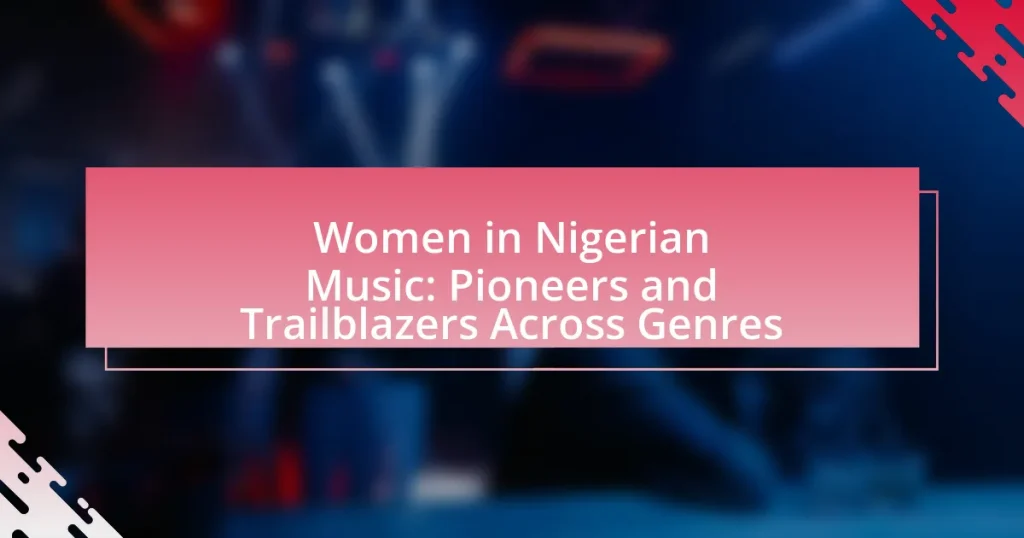Independent labels in the Nigerian music scene are music production companies that operate independently of major record labels, focusing on discovering, promoting, and distributing music from artists without corporate backing. The article explores the rise of these labels, highlighting their role in fostering artistic freedom, supporting local talent, and contributing to the diversification of music genres in Nigeria. It examines the differences between independent and major labels, the impact of technology and digital platforms on their growth, and the challenges they face, including competition and legal issues. Additionally, the article discusses strategies for success and the future prospects of independent labels in the evolving music landscape.
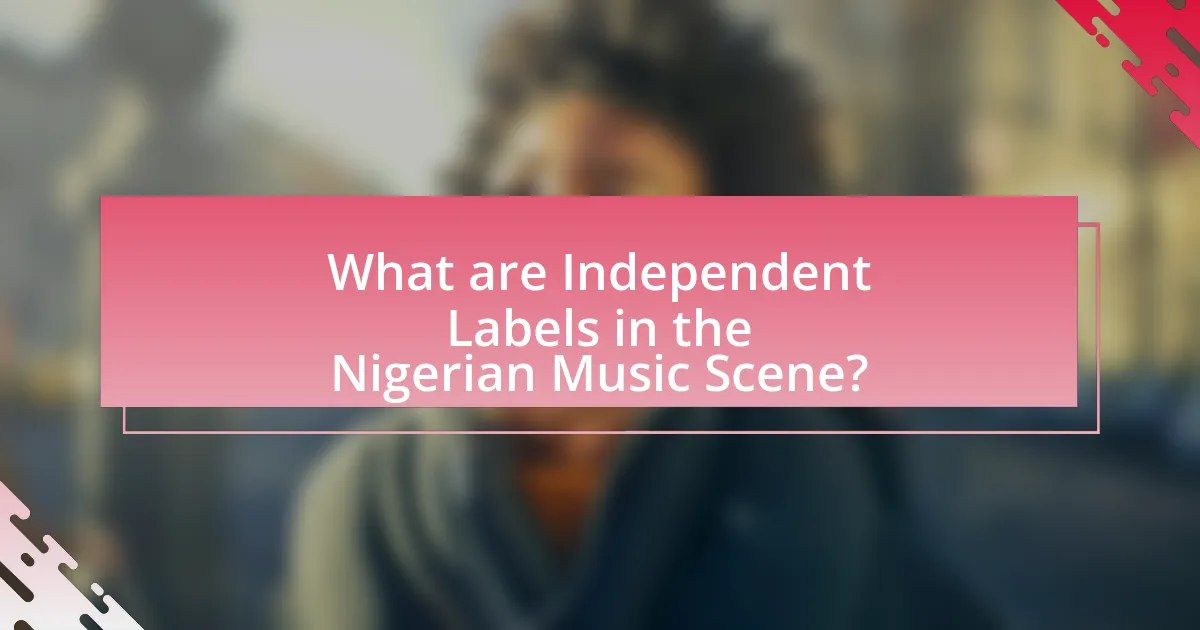
What are Independent Labels in the Nigerian Music Scene?
Independent labels in the Nigerian music scene are music production companies that operate independently of major record labels. These labels focus on discovering, promoting, and distributing music from artists without the backing of large corporate entities. Independent labels have gained prominence in Nigeria due to the rise of digital platforms, which allow artists to reach audiences directly, bypassing traditional distribution channels. For instance, the success of artists like Burna Boy and Tems, who initially worked with independent labels, showcases the potential for these entities to thrive in a competitive market. The growth of independent labels has contributed significantly to the diversification and globalization of Nigerian music, as they often prioritize artistic freedom and innovative sounds over commercial pressures.
How do Independent Labels differ from Major Labels?
Independent labels differ from major labels primarily in their operational scale, funding sources, and artistic control. Independent labels typically operate on a smaller scale, relying on alternative funding methods such as crowdfunding or personal investments, while major labels have substantial financial backing from large corporations. This financial difference allows major labels to invest heavily in marketing and distribution, giving them a broader reach in the music industry. Additionally, artists signed to independent labels often enjoy greater creative freedom and control over their music, whereas major labels may impose commercial pressures that influence artistic direction. This distinction is evident in the Nigerian music scene, where independent labels have gained traction by promoting diverse sounds and fostering local talent without the constraints often associated with major label contracts.
What are the key characteristics of Independent Labels?
Independent labels are characterized by their autonomy from major record companies, allowing for greater creative control and flexibility in artist development. They typically focus on niche markets and often prioritize artistic integrity over commercial success. Independent labels frequently foster close relationships with their artists, providing personalized support and resources tailored to individual needs. Additionally, they often utilize innovative marketing strategies and digital platforms to reach audiences, which can lead to a more engaged fan base. The rise of independent labels in Nigeria has been marked by a significant increase in local talent and diverse musical genres, reflecting the country’s rich cultural landscape.
Why do artists choose Independent Labels over Major Labels?
Artists choose independent labels over major labels primarily for greater creative control and a more personalized approach to their music. Independent labels often allow artists to maintain ownership of their work, enabling them to make artistic decisions without the constraints typically imposed by major labels. For instance, a study by the Music Industry Research Association found that artists signed to independent labels reported higher satisfaction levels regarding their creative freedom and financial arrangements. This trend is particularly evident in the Nigerian music scene, where many artists prefer the flexibility and support offered by independent labels to cultivate their unique sound and brand.
What role do Independent Labels play in the Nigerian music industry?
Independent labels play a crucial role in the Nigerian music industry by providing artists with opportunities for creative freedom and financial support. These labels often focus on nurturing local talent, allowing musicians to produce and distribute their work without the constraints typically imposed by major record labels. For instance, independent labels like Chocolate City and Mavin Records have successfully launched the careers of numerous artists, contributing to the diversification and globalization of Nigerian music. Additionally, independent labels facilitate access to digital platforms, enabling artists to reach wider audiences and generate revenue through streaming, which has become increasingly important in the industry.
How do Independent Labels contribute to the diversity of music genres?
Independent labels significantly contribute to the diversity of music genres by promoting a wide range of musical styles that mainstream labels often overlook. These independent entities provide platforms for emerging artists, allowing them to experiment with unique sounds and cultural influences that reflect local and global diversity. For instance, in Nigeria, independent labels have been pivotal in popularizing genres like Afrobeats, alternative music, and indigenous sounds, which may not receive attention from major labels. This has led to a richer musical landscape, as artists are encouraged to explore and innovate without the constraints typically imposed by larger corporations. The result is a vibrant mix of genres that showcases the cultural heritage and contemporary influences of the Nigerian music scene.
What impact do Independent Labels have on local talent development?
Independent labels significantly enhance local talent development by providing resources, mentorship, and platforms for emerging artists. These labels often focus on nurturing local talent that mainstream labels may overlook, allowing for a diverse range of musical expressions. For instance, independent labels in Nigeria, such as Chocolate City and Mavin Records, have successfully launched the careers of artists like Ice Prince and Rema, respectively, demonstrating their role in fostering new talent. Additionally, independent labels typically offer more creative freedom, enabling artists to develop their unique sound and identity, which is crucial for long-term success in the music industry.
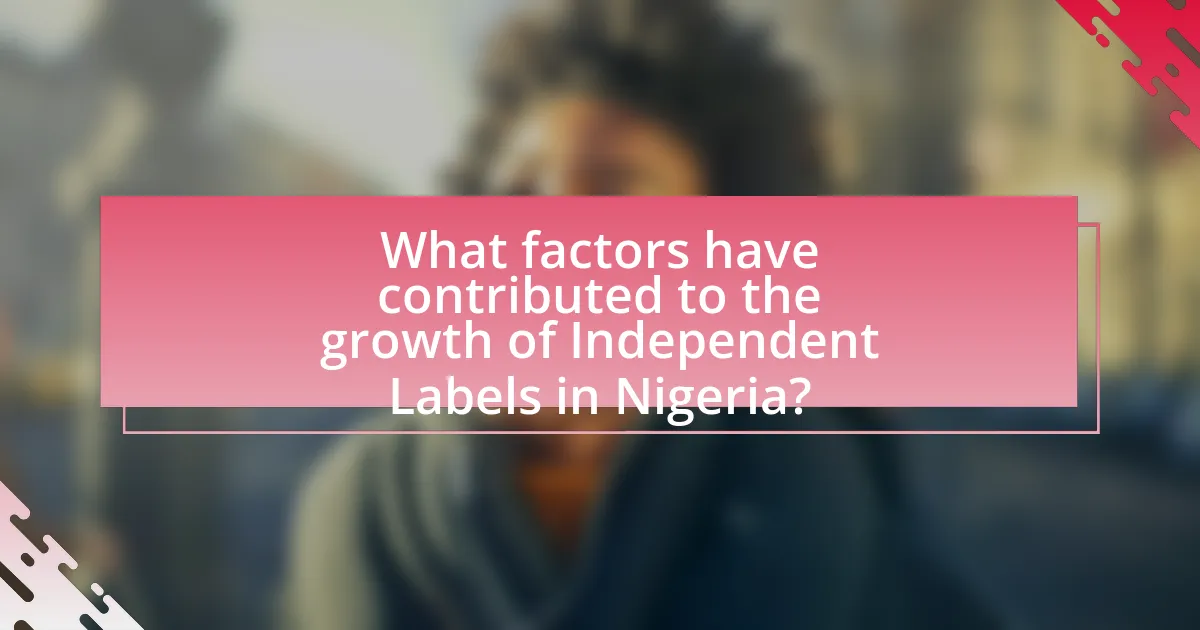
What factors have contributed to the growth of Independent Labels in Nigeria?
The growth of independent labels in Nigeria has been significantly driven by the rise of digital distribution platforms and the increasing accessibility of music production technology. Digital platforms like Spotify and Apple Music have enabled independent artists to reach global audiences without the need for traditional record label support. Additionally, advancements in affordable music production software and equipment have empowered artists to produce high-quality music independently. According to a 2021 report by the International Federation of the Phonographic Industry, Nigeria’s music market grew by 25% in 2020, largely due to the contributions of independent labels and artists leveraging these digital tools.
How has technology influenced the rise of Independent Labels?
Technology has significantly influenced the rise of independent labels by providing accessible tools for music production, distribution, and marketing. Digital audio workstations and affordable recording equipment have enabled artists to produce high-quality music without the need for expensive studio time, allowing independent labels to thrive. Additionally, platforms like Spotify, Apple Music, and SoundCloud have democratized music distribution, enabling independent labels to reach global audiences without traditional gatekeepers. According to a report by the International Federation of the Phonographic Industry (IFPI), independent labels accounted for 40% of global recorded music revenue in 2020, highlighting their growing impact in the industry. This shift has empowered artists in the Nigerian music scene to establish independent labels, fostering a diverse and vibrant musical landscape.
What digital platforms are most beneficial for Independent Labels?
Independent labels benefit significantly from digital platforms such as Spotify, Apple Music, and YouTube. These platforms provide independent artists with extensive reach and access to global audiences, which is crucial for growth in the competitive music industry. For instance, Spotify’s algorithm-driven playlists can enhance visibility, leading to increased streams and fan engagement. Additionally, YouTube serves as a vital promotional tool, allowing independent labels to showcase music videos and connect with fans through visual content. According to a report by the International Federation of the Phonographic Industry (IFPI), streaming services accounted for 62.1% of global recorded music revenue in 2020, highlighting the importance of these platforms for independent labels seeking financial sustainability and audience expansion.
How has social media changed the landscape for Independent Labels?
Social media has significantly transformed the landscape for independent labels by providing them with direct access to audiences and marketing tools that were previously unavailable. Independent labels can now promote their artists and music through platforms like Instagram, Twitter, and TikTok, enabling them to reach global audiences without the need for traditional distribution channels. For instance, Nigerian independent labels have leveraged social media to showcase local talent, resulting in a surge of artists gaining international recognition, such as Burna Boy and Wizkid, who initially built their fan bases online. This shift has democratized music promotion, allowing independent labels to compete with major labels by utilizing viral marketing strategies and engaging directly with fans.
What economic factors support the growth of Independent Labels?
Economic factors that support the growth of independent labels include lower operational costs, increased access to digital distribution, and a growing consumer preference for diverse music genres. Lower operational costs allow independent labels to invest more in artist development and marketing, which is crucial for their sustainability. The rise of digital platforms like Spotify and Apple Music has democratized music distribution, enabling independent labels to reach global audiences without the need for traditional distribution channels. Additionally, the Nigerian music scene has seen a shift in consumer behavior, with audiences increasingly seeking out unique and culturally relevant music, which independent labels are often better positioned to provide. This combination of reduced costs, enhanced distribution opportunities, and changing consumer preferences creates a favorable economic environment for the growth of independent labels in Nigeria.
How do funding and investment opportunities affect Independent Labels?
Funding and investment opportunities significantly enhance the operational capacity and market reach of independent labels. Access to financial resources allows these labels to invest in artist development, marketing, and distribution, which are crucial for competing with major labels. For instance, a report by the International Federation of the Phonographic Industry (IFPI) highlights that independent labels that secure funding can increase their revenue by up to 30% through improved promotional strategies and wider distribution channels. This financial backing not only supports the production of high-quality music but also enables independent labels to explore innovative marketing techniques, thereby increasing their visibility in a competitive market.
What role do collaborations and partnerships play in their success?
Collaborations and partnerships are crucial for the success of independent labels in the Nigerian music scene as they enhance visibility and access to diverse audiences. By working with established artists and brands, independent labels can leverage existing fan bases, which significantly boosts their market reach. For instance, collaborations often lead to chart-topping hits, as seen with artists like Burna Boy and Wizkid, who have successfully partnered with international acts, thereby elevating their profiles and expanding their listener demographics. This strategic alliance not only fosters creativity but also facilitates resource sharing, which is essential for independent labels operating with limited budgets.
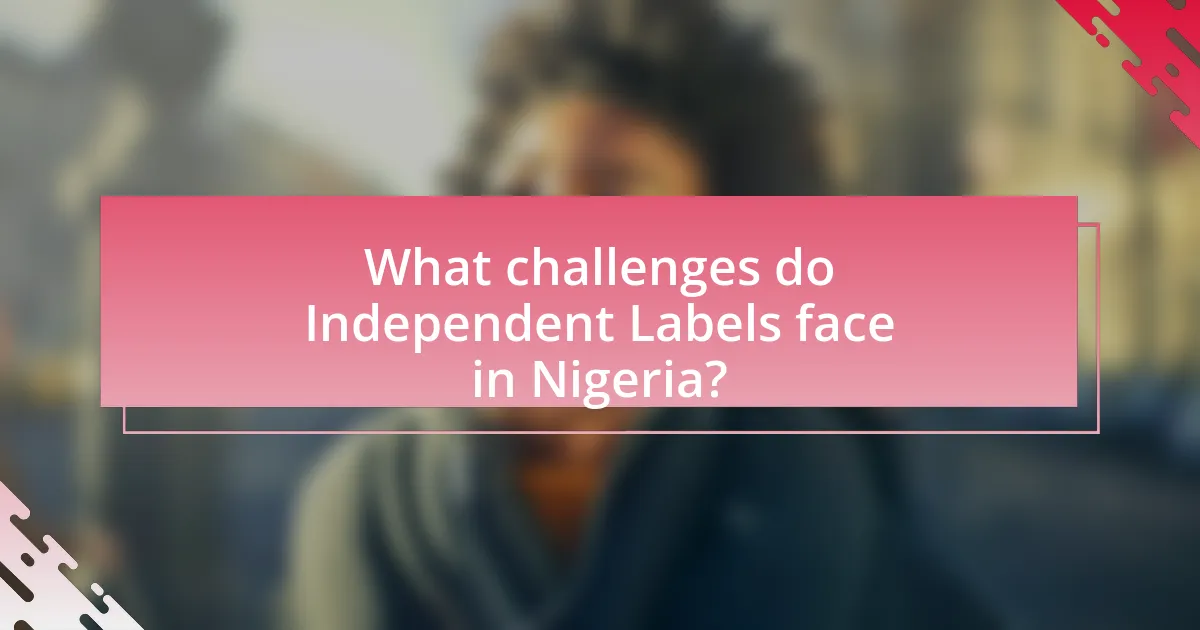
What challenges do Independent Labels face in Nigeria?
Independent labels in Nigeria face significant challenges, including limited access to funding, inadequate distribution networks, and intense competition from major record labels. These independent entities often struggle to secure financial backing, which hampers their ability to invest in marketing and production. According to a 2021 report by the Nigerian Music Industry Coalition, over 70% of independent labels reported difficulties in obtaining loans or investment due to a lack of collateral and formal business structures. Additionally, the distribution of music remains a challenge, as many independent labels lack partnerships with established distribution platforms, limiting their reach. The competitive landscape is further complicated by the dominance of major labels, which have more resources and established market presence, making it difficult for independent labels to gain visibility and market share.
How do legal and regulatory issues impact Independent Labels?
Legal and regulatory issues significantly impact independent labels by influencing their operational capabilities and market access. For instance, stringent copyright laws can limit the ability of independent labels to distribute music without facing legal repercussions, thereby affecting their revenue streams. Additionally, regulatory requirements for licensing and compliance can impose financial burdens on these labels, making it challenging for them to compete with larger, established entities. In Nigeria, the lack of a robust legal framework for intellectual property rights has historically hindered independent labels from fully capitalizing on their creative outputs, as evidenced by the low rate of music royalties collected and distributed to artists and labels. This environment creates barriers to entry and sustainability for independent labels, ultimately affecting their growth and contribution to the music scene.
What are the common legal hurdles faced by Independent Labels?
Independent labels in Nigeria commonly face legal hurdles such as copyright infringement, contract disputes, and licensing issues. Copyright infringement occurs when independent labels struggle to protect their intellectual property rights, leading to unauthorized use of their music. Contract disputes often arise from unclear agreements with artists or distributors, resulting in legal battles over revenue sharing and rights management. Additionally, licensing issues can complicate the distribution of music, as independent labels may lack the resources to navigate the complex legal landscape required for proper licensing, which is essential for legal sales and streaming. These challenges hinder the growth and sustainability of independent labels in the Nigerian music scene.
How can Independent Labels navigate the Nigerian music copyright landscape?
Independent labels can navigate the Nigerian music copyright landscape by registering their works with the Copyright Society of Nigeria (COSON) and understanding the legal frameworks governing copyright in Nigeria. By registering with COSON, independent labels gain access to collective rights management, ensuring they receive royalties for their music. Additionally, familiarizing themselves with the Nigerian Copyright Act, which protects original works and outlines the rights of creators, allows independent labels to safeguard their intellectual property effectively. This proactive approach is essential, as the Nigerian music industry has seen a rise in copyright infringement cases, making it crucial for independent labels to establish their rights legally and protect their creative outputs.
What market competition do Independent Labels encounter?
Independent labels encounter significant competition from major record labels, digital streaming platforms, and other independent labels. Major record labels dominate the market with extensive resources, established artist rosters, and strong promotional capabilities, making it challenging for independent labels to secure visibility and market share. Additionally, digital streaming platforms like Spotify and Apple Music create a crowded environment where numerous artists compete for listener attention, often favoring those with larger marketing budgets. Furthermore, independent labels face competition from each other, as they strive to attract talent and audience engagement in a rapidly evolving music landscape. This competitive environment necessitates innovative marketing strategies and unique artist development approaches for independent labels to thrive.
How do Independent Labels compete with Major Labels?
Independent labels compete with major labels by leveraging niche marketing, innovative distribution methods, and artist-centric approaches. These labels often focus on specific genres or local markets, allowing them to build strong, loyal fan bases that major labels may overlook. For instance, independent labels utilize digital platforms like Bandcamp and SoundCloud to distribute music directly to consumers, bypassing traditional distribution channels that major labels rely on. This direct-to-fan model not only reduces costs but also increases profit margins for artists. Additionally, independent labels often offer more creative control to their artists, which can lead to unique and authentic music that resonates with audiences. According to a 2021 report by the International Federation of the Phonographic Industry, independent labels accounted for 40% of global recorded music revenues, demonstrating their significant impact and competitive presence in the industry.
What strategies can Independent Labels employ to stand out?
Independent labels can stand out by leveraging unique branding, targeted marketing, and artist development strategies. Unique branding helps create a distinct identity that resonates with specific audiences, while targeted marketing, including social media campaigns and collaborations with influencers, increases visibility. Additionally, focusing on artist development ensures that musicians receive the necessary support to grow their careers, which can lead to a loyal fan base. For instance, independent labels like Chocolate City have successfully utilized these strategies to cultivate a strong presence in the Nigerian music scene, demonstrating the effectiveness of these approaches.
What are the future prospects for Independent Labels in Nigeria?
The future prospects for independent labels in Nigeria are promising, driven by the increasing digitalization of music distribution and a growing local and international audience. Independent labels are capitalizing on platforms like Spotify and Apple Music, which have expanded access to Nigerian music globally, leading to a rise in revenue opportunities. Additionally, the Nigerian music industry has seen a surge in talent, with artists gaining recognition and success without major label backing, as evidenced by the global success of artists like Burna Boy and Wizkid, who initially worked with independent labels. This trend indicates a shift towards a more diverse and competitive music landscape, where independent labels can thrive by fostering unique sounds and innovative marketing strategies.
How can Independent Labels adapt to changing consumer preferences?
Independent labels can adapt to changing consumer preferences by leveraging data analytics to understand audience trends and preferences. By analyzing streaming data, social media interactions, and consumer feedback, independent labels can identify shifts in musical tastes and emerging genres. For instance, a report from the International Federation of the Phonographic Industry (IFPI) indicates that 70% of music consumers prefer personalized experiences, highlighting the importance of tailored marketing strategies. Additionally, independent labels can collaborate with local artists and influencers to create culturally relevant content that resonates with their target audience, thereby enhancing engagement and loyalty.
What trends are emerging that could influence the growth of Independent Labels?
Emerging trends that could influence the growth of independent labels in the Nigerian music scene include the rise of digital distribution platforms, increased access to affordable recording technology, and a growing preference for local content among consumers. Digital platforms like Spotify and Apple Music have made it easier for independent artists to reach global audiences without the need for traditional label support. Additionally, advancements in recording technology have lowered production costs, enabling more artists to create high-quality music independently. Furthermore, the Nigerian audience’s shift towards supporting local talent has created a favorable environment for independent labels to thrive, as evidenced by the increasing popularity of homegrown artists and genres.
What best practices can Independent Labels adopt for success?
Independent labels can achieve success by focusing on strategic marketing, building strong artist relationships, and leveraging digital platforms. Strategic marketing involves identifying target audiences and utilizing social media and online advertising to reach them effectively. Building strong relationships with artists fosters loyalty and encourages collaboration, which can enhance creativity and output quality. Leveraging digital platforms, such as streaming services and social media, allows independent labels to distribute music widely and engage with fans directly, which is crucial in the competitive Nigerian music scene. According to a report by the International Federation of the Phonographic Industry, digital music revenues in Nigeria grew by 25% in 2020, highlighting the importance of online presence for independent labels.
How can Independent Labels effectively market their artists?
Independent labels can effectively market their artists by leveraging digital platforms, social media, and targeted promotional strategies. Digital platforms such as Spotify and Apple Music allow independent labels to distribute music widely, while social media channels like Instagram and TikTok enable direct engagement with fans. According to a report by the International Federation of the Phonographic Industry (IFPI), 70% of music consumers discover new artists through streaming services and social media, highlighting the importance of these channels. Additionally, independent labels can utilize data analytics to understand audience preferences and tailor marketing campaigns accordingly, ensuring that promotional efforts resonate with potential listeners.
What strategies can enhance the sustainability of Independent Labels?
To enhance the sustainability of independent labels, diversifying revenue streams is essential. Independent labels can achieve this by exploring various income sources such as merchandise sales, live performances, licensing deals, and digital distribution. For instance, according to a report by the International Federation of the Phonographic Industry (IFPI), the global recorded music market grew by 7.4% in 2021, driven by streaming and live music, indicating that independent labels can capitalize on these trends to secure financial stability. Additionally, fostering strong relationships with artists and investing in marketing strategies can further solidify their market presence and ensure long-term viability.









